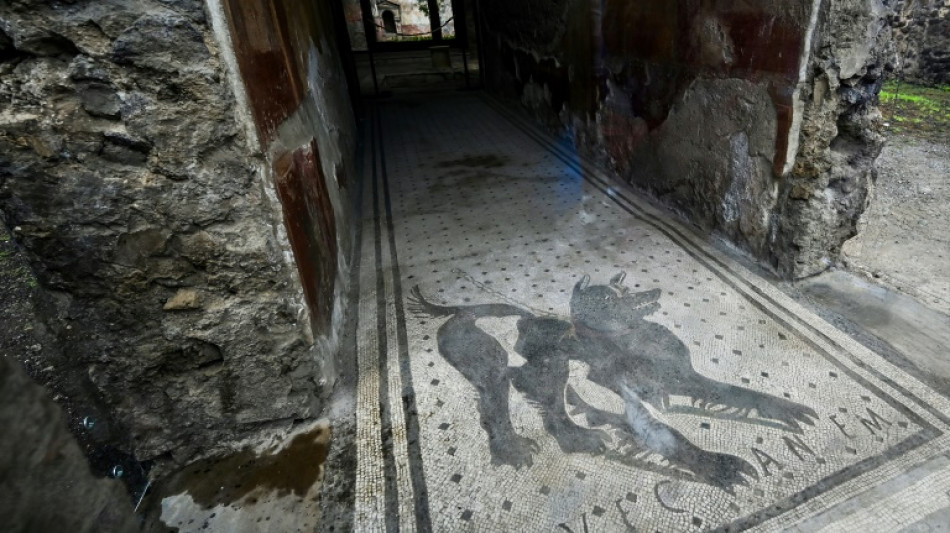
-
 Alonso's Real Madrid revitalised for new Champions League mission
Alonso's Real Madrid revitalised for new Champions League mission
-
Arsenal eye Champions League charge with revamped attack

-
 'No regrets': wounded Nepali protesters proud at change
'No regrets': wounded Nepali protesters proud at change
-
Key Emmys moments: Children, Colbert, women and politics

-
 'No regrets': wounded Nepalis protesters proud at change
'No regrets': wounded Nepalis protesters proud at change
-
'Adolescence,' 'The Studio' dominate television's Emmy Awards

-
 WTO fishing deal: the net results
WTO fishing deal: the net results
-
Malaysia's largest island state aims to be region's 'green battery'

-
 Philippines president says corruption scandal protests justified
Philippines president says corruption scandal protests justified
-
Asian markets fluctuate ahead of expected US rate cut

-
 UK aristocrat, partner face jail over baby daughter's death
UK aristocrat, partner face jail over baby daughter's death
-
Japan and Fiji cruise into Pacific Nations Cup rugby final rematch

-
 As King Charles hosts Trump, what do UK state visits entail?
As King Charles hosts Trump, what do UK state visits entail?
-
First-ever Tanzanian gold as Simbu dips past Petros in world marathon
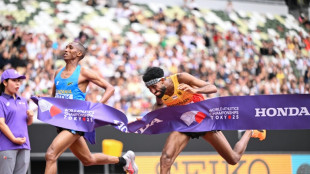
-
 100 days later, US federal workers navigate post-Musk wreckage
100 days later, US federal workers navigate post-Musk wreckage
-
Rising oceans to threaten 1.5 million Australians by 2050: report
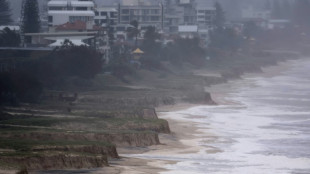
-
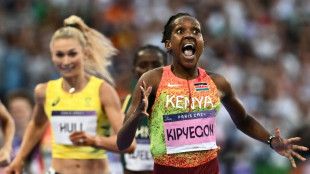 Kipyegon bids for fourth 1500m world gold, Wanyonyi in loaded 800m
Kipyegon bids for fourth 1500m world gold, Wanyonyi in loaded 800m
-
'The Studio,' 'Severance' and 'Adolescence' among Emmy winners

-
 Trump and King Charles: heads of state with opposing personalities
Trump and King Charles: heads of state with opposing personalities
-
Scheffler surges to PGA Procore victory in Ryder Cup warm-up

-
 Bloody Sunday trial of British ex-soldier to open in Belfast
Bloody Sunday trial of British ex-soldier to open in Belfast
-
Trump heads for historic second UK state visit

-
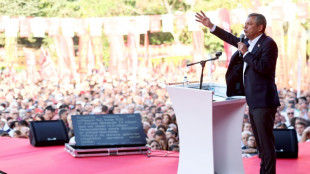 Turkey court tries case that could oust opposition leadership
Turkey court tries case that could oust opposition leadership
-
Simbu dips past Petros for world marathon gold
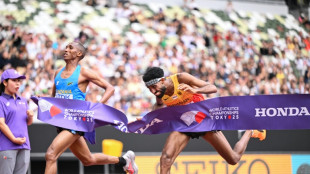
-
 Mexico's macabre Island of the Dolls inspires Tim Burton and Lady Gaga
Mexico's macabre Island of the Dolls inspires Tim Burton and Lady Gaga
-
Television stars shine bright on Emmys red carpet

-
 'The Studio' claims early win as TV's Emmys kick off
'The Studio' claims early win as TV's Emmys kick off
-
Japan rips Tonga to reach Pacific Nations Cup rugby final

-
 Australia's ANZ bank hit with record fine over 'widespread misconduct'
Australia's ANZ bank hit with record fine over 'widespread misconduct'
-
Eagles top Chiefs in Super Bowl rematch as Cowboys edge Giants in NFL thriller

-
 Seattle's Raleigh hits 54th homer of season for MLB marks
Seattle's Raleigh hits 54th homer of season for MLB marks
-
NFL Cowboys top Giants in overtime while Lions maul Bears

-
 Trump concerned S. Korean arrests could 'frighten' investors
Trump concerned S. Korean arrests could 'frighten' investors
-
Timeless Modric opens AC Milan account with winner against Bologna

-
 Spring quick-fire hat-trick helps Racing stun Bordeaux-Begles
Spring quick-fire hat-trick helps Racing stun Bordeaux-Begles
-
Macau's first 'patriots' election sees low turnout

-
 Prince Harry says has 'clear conscience' over explosive memoir
Prince Harry says has 'clear conscience' over explosive memoir
-
Modric opens AC Milan account with winner against Bologna

-
 Schroeder seals Euro basketball title for world champions Germany
Schroeder seals Euro basketball title for world champions Germany
-
Hull wins LPGA Queen City title after Jeeno four-putt bogey at 18

-
 Spain's political class spars over chaotic Vuelta finale
Spain's political class spars over chaotic Vuelta finale
-
Top four into Women's Rugby World Cup semi-finals as France edge Ireland

-
 Two ships set sail from Greece to join Gaza aid flotilla
Two ships set sail from Greece to join Gaza aid flotilla
-
Amorim won't change despite 'suffering' in dismal Man Utd run

-
 Australia stunned by Belgium, joining USA on Davis Cup scrapheap
Australia stunned by Belgium, joining USA on Davis Cup scrapheap
-
Spinners power India to win over Pakistan in Asia Cup

-
 Bolsonaro conviction 'not a witch hunt,' Lula tells Trump in NYT op-ed
Bolsonaro conviction 'not a witch hunt,' Lula tells Trump in NYT op-ed
-
'Demon Slayer' tops N.America box office with record anime opening
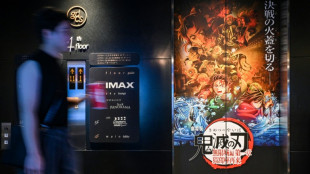
-
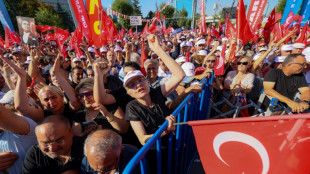 Tens of thousands join Ankara protest ahead of court showdown
Tens of thousands join Ankara protest ahead of court showdown
-
Haaland-inspired Man City inflict derby demolition on Man Utd


AI helps Latin scholars decipher ancient Roman texts
Around 1,500 Latin inscriptions are discovered every year, offering an invaluable view into the daily life of ancient Romans -- and posing a daunting challenge for the historians tasked with interpreting them.
But a new artificial intelligence tool, partly developed by Google researchers, can now help Latin scholars piece together these puzzles from the past, according to a study published on Wednesday.
Inscriptions in Latin were commonplace across the Roman world, from laying out the decrees of emperors to graffiti on the city streets. One mosaic outside a home in the ancient city of Pompeii even warns: "Beware of the dog".
These inscriptions are "so precious to historians because they offer first-hand evidence of ancient thought, language, society and history", said study co-author Yannis Assael, a researcher at Google's AI lab DeepMind.
"What makes them unique is that they are written by the ancient people themselves across all social classes on any subject. It's not just history written by the elite," Assael, who co-designed the AI model, told a press conference.
However these texts have often been damaged over the millennia.
"We usually don't know where and when they were written," Assael said.
So the researchers created a generative neural network, which is an AI tool that can be trained to identify complex relationships between types of data.
They named their model Aeneas, after the Trojan hero and son of the Greek goddess Aphrodite.
It was trained on data about the dates, locations and meanings of Latin transcriptions from an empire that spanned five million square kilometres over two millennia.
Thea Sommerschield, an epigrapher at the University of Nottingham who co-designed the AI model, said that "studying history through inscriptions is like solving a gigantic jigsaw puzzle".
"You can't solve the puzzle with a single isolated piece, even though you know information like its colour or its shape," she explained.
"To solve the puzzle, you need to use that information to find the pieces that connect to it."
- Tested on Augustus -
This can be a huge job.
Latin scholars have to compare inscriptions against "potentially hundreds of parallels", a task which "demands extraordinary erudition" and "laborious manual searches" through massive library and museum collections, the study in the journal Nature said.
The researchers trained their model on 176,861 inscriptions -- worth up to 16 million characters -- five percent of which contained images.
It can now estimate the location of an inscription among the 62 Roman provinces, offer a decade when it was produced and even guess what missing sections might have contained, they said.
To test their model, the team asked Aeneas to analyse a famous inscription called "Res Gestae Divi Augusti", in which Rome's first emperor Augustus detailed his accomplishments.
Debate still rages between historians about when exactly the text was written.
Though the text is riddled with exaggerations, irrelevant dates and erroneous geographical references, the researchers said that Aeneas was able to use subtle clues such as archaic spelling to land on two possible dates -- the two being debated between historians.
More than 20 historians who tried out the model found it provided a useful starting point in 90 percent of cases, according to DeepMind.
The best results came when historians used the AI model together with their skills as researchers, rather than relying solely on one or the other, the study said.
"Since their breakthrough, generative neural networks have seemed at odds with educational goals, with fears that relying on AI hinders critical thinking rather than enhances knowledge," said study co-author Robbe Wulgaert, a Belgian AI researcher.
"By developing Aeneas, we demonstrate how this technology can meaningfully support the humanities by addressing concrete challenges historians face."
E.Burkhard--VB

